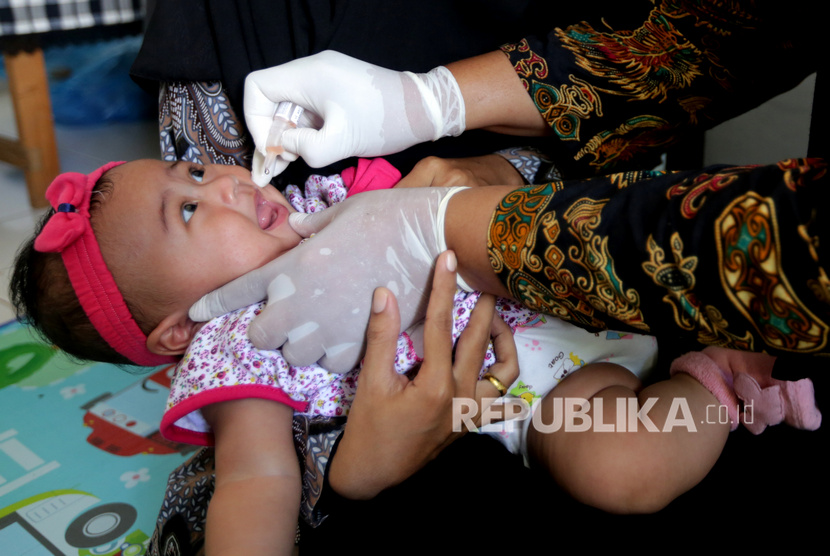The total number of mandatory routine immunizations for children from 0 months to 14 types of vaccines.
REPUBLIKA.CO.ID, JAKARTA — This year the Ministry of Health has increased the number of mandatory routine immunizations in Indonesia, from 11 vaccines to 14 vaccines. Routine immunization is a government program which means that people do not have to spend money to get these vaccines, including the Human Papilloma Virus (HPV) vaccine.
The other two vaccines are the Pneumococcal Conjugate Vaccine (PCV) and the Rotavirus vaccine. The PCV vaccine aims to prevent pneumonia, inflammation of the lining of the brain, and inflammation of the ear caused by Pneumococcal bacteria. While the Rotavirus vaccine is to prevent severe diarrhea and its complications caused by the Rota virus and the HPV vaccine is to prevent cervical cancer (cervical cancer) in women.
Starting this year, the PCV vaccine will be given nationally. This year’s HPV vaccine is also given in 131 regencies/cities in 8 provinces, consisting of 4 provinces on the island of Java and 4 provinces outside Java (DKI Jakarta Province, DI Yogyakarta, Central Java, East Java, North Sulawesi, Southeast Sulawesi, Gorontalo, and Bali).
It is planned that in 2023 it will be implemented in all provinces and districts/cities.
Meanwhile, immunization with the Rotavirus vaccine will begin in 2022 in 21 districts/cities representing each island, and will be administered nationally in 2024. All immunization programs that are part of the mandatory routine immunization program will be free of charge, under certain conditions. and certain requirements.
For example, the HPV vaccine is required for girls in grades 5 and 6 of elementary school. This is carried out in the School Child Immunization Month (BIAS) program which is held in August every year.
Indonesian Minister of Health Budi Gunadi Sadikin said immunization was the most appropriate and inexpensive way to prevent maternal and child mortality.
“Vaccination is one of the health interventions that is cheaper and more effective than intervention when someone has been admitted to hospital,” he said in a written statement, Saturday (23/4/2022).
Immunization or vaccination is a cost-effective upstream health intervention method to reduce morbidity, disability and death from diseases that can be prevented by immunization. History has proven that Indonesia is free from smallpox and polio, eliminates tetanus in mothers and babies, and reduces measles and rubella cases, one of which is the success of immunization.
“We need to maintain this hard work and continue,” said Budi.
In the framework of this year’s World Immunization Week (PID), for a week from April 16 to 22, 2022, various series of activities will be carried out, both at the central and regional levels, in order to raise awareness and collective support from all elements of society to increase immunization coverage. .
Through the momentum of World Immunization Week in 2022, we hope that the central, provincial and regional governments can strengthen policies and strategies for implementing immunization programs in their respective regions, and continue to carry out public education programs to increase public knowledge and awareness of the importance of immunization.
This series of World Immunization Week activities will also be the opening of the big agenda for the national immunization program in 2022, namely the implementation of the National Child Immunization Month (BIAN) which will begin in mid-May.
Here are 11 types of vaccines that were previously used.
1. Complete basic immunization for infants aged 0-11 months
- 1 Month: BCG Polio 1, prevents transmission of tuberculosis and polio
- 2 Months : DPT-HB-Hib 1 Polio 2, prevents polio, diphtheria, whooping cough, retanus, hepatitis B, meningitis, & pneumonia
- 3 Months: DPT-HB-Hib 2 Polio 3
- 4 Months: DPT-HB-Hib 3 Polio 4
- 9 Months: Measles, prevent measles
2. Follow-up immunizations for infants aged 18-24 months
- 1 dose of DPT-HB-Hib immunization, serves to prevent diphtheria, pertussis, tetanus, hepatitis B, pneumonia, and meningitis
- Rubella measles immunization 1 dose
3. Advanced immunization of elementary school children in the annual National Immunization Month program
- Immunization of measles, rubella and DT in grade 1 children
- Tethanus diphtheria immunization td in grade 2 and grade 5
–


